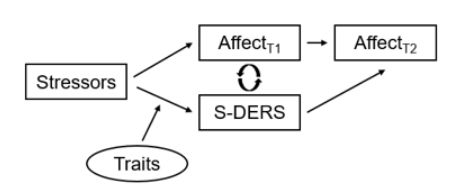Maurizio Sicorello
@msicorello.bsky.social
Working as a Postdoc on emotion (dysregulation) from a psychological, neural (fMRI), and molecular perspective at the Central Institute of Mental Health (Mannheim, Germany). I am that one person who likes both modern metal/hardcore music and Gilmore Girls.
New preprint out! 🔬
We provide daily life versions for the State Difficulties in Emotion Regulation Scale together with a ton of insights on temporal dynamics and relations to momentary stressors and affect :)
doi.org/10.31234/osf...
We provide daily life versions for the State Difficulties in Emotion Regulation Scale together with a ton of insights on temporal dynamics and relations to momentary stressors and affect :)
doi.org/10.31234/osf...

September 9, 2025 at 8:09 AM
New preprint out! 🔬
We provide daily life versions for the State Difficulties in Emotion Regulation Scale together with a ton of insights on temporal dynamics and relations to momentary stressors and affect :)
doi.org/10.31234/osf...
We provide daily life versions for the State Difficulties in Emotion Regulation Scale together with a ton of insights on temporal dynamics and relations to momentary stressors and affect :)
doi.org/10.31234/osf...
When you correlate these three outcomes with brain-wide responses on a between-person level (explanation later), you see that trait questionnaires correlate with nothing, task-based ratings correlate with small responses outside emotion regulation networks and the amygdala correlates with everything

August 19, 2025 at 11:43 AM
When you correlate these three outcomes with brain-wide responses on a between-person level (explanation later), you see that trait questionnaires correlate with nothing, task-based ratings correlate with small responses outside emotion regulation networks and the amygdala correlates with everything
There are three common outcomes used to indicate who is better at emotion regulation. These three outcome types barely overlap.
There are two important lessons from this:
1) Already the most used trait questionnaires and task-based self-reports do not correlate, i.e. measure unrelated things
There are two important lessons from this:
1) Already the most used trait questionnaires and task-based self-reports do not correlate, i.e. measure unrelated things

August 19, 2025 at 11:43 AM
There are three common outcomes used to indicate who is better at emotion regulation. These three outcome types barely overlap.
There are two important lessons from this:
1) Already the most used trait questionnaires and task-based self-reports do not correlate, i.e. measure unrelated things
There are two important lessons from this:
1) Already the most used trait questionnaires and task-based self-reports do not correlate, i.e. measure unrelated things
Invited comment:
We need a better taxonomy of emotional dysfunctions to understand their neurobiology; a role neither clinical categories nor hiTOP-like dimensions currently fulfill IMO.
...and more "respect" for current basic affective neuroscience
Share link: authors.elsevier.com/a/1lYd48jVtv...
We need a better taxonomy of emotional dysfunctions to understand their neurobiology; a role neither clinical categories nor hiTOP-like dimensions currently fulfill IMO.
...and more "respect" for current basic affective neuroscience
Share link: authors.elsevier.com/a/1lYd48jVtv...

August 7, 2025 at 3:45 PM
Invited comment:
We need a better taxonomy of emotional dysfunctions to understand their neurobiology; a role neither clinical categories nor hiTOP-like dimensions currently fulfill IMO.
...and more "respect" for current basic affective neuroscience
Share link: authors.elsevier.com/a/1lYd48jVtv...
We need a better taxonomy of emotional dysfunctions to understand their neurobiology; a role neither clinical categories nor hiTOP-like dimensions currently fulfill IMO.
...and more "respect" for current basic affective neuroscience
Share link: authors.elsevier.com/a/1lYd48jVtv...

